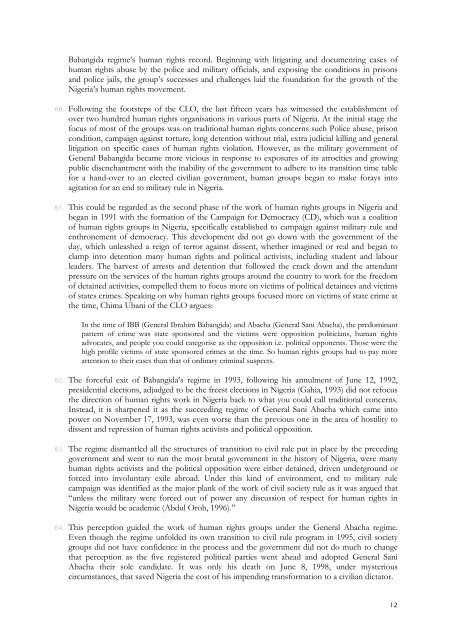114 - Nigeria - Crime and Human Rights Shettima, Kole - The ICHRP
114 - Nigeria - Crime and Human Rights Shettima, Kole - The ICHRP
114 - Nigeria - Crime and Human Rights Shettima, Kole - The ICHRP
You also want an ePaper? Increase the reach of your titles
YUMPU automatically turns print PDFs into web optimized ePapers that Google loves.
Babangida regime’s human rights record. Beginning with litigating <strong>and</strong> documenting cases of<br />
human rights abuse by the police <strong>and</strong> military officials, <strong>and</strong> exposing the conditions in prisons<br />
<strong>and</strong> police jails, the group’s successes <strong>and</strong> challenges laid the foundation for the growth of the<br />
<strong>Nigeria</strong>’s human rights movement.<br />
60. Following the footsteps of the CLO, the last fifteen years has witnessed the establishment of<br />
over two hundred human rights organisations in various parts of <strong>Nigeria</strong>. At the initial stage the<br />
focus of most of the groups was on traditional human rights concerns such Police abuse, prison<br />
condition, campaign against torture, long detention without trial, extra judicial killing <strong>and</strong> general<br />
litigation on specific cases of human rights violation. However, as the military government of<br />
General Babangida became more vicious in response to exposures of its atrocities <strong>and</strong> growing<br />
public disenchantment with the inability of the government to adhere to its transition time table<br />
for a h<strong>and</strong>-over to an elected civilian government, human groups began to make forays into<br />
agitation for an end to military rule in <strong>Nigeria</strong>.<br />
61. This could be regarded as the second phase of the work of human rights groups in <strong>Nigeria</strong> <strong>and</strong><br />
began in 1991 with the formation of the Campaign for Democracy (CD), which was a coalition<br />
of human rights groups in <strong>Nigeria</strong>, specifically established to campaign against military rule <strong>and</strong><br />
enthronement of democracy. This development did not go down with the government of the<br />
day, which unleashed a reign of terror against dissent, whether imagined or real <strong>and</strong> began to<br />
clamp into detention many human rights <strong>and</strong> political activists, including student <strong>and</strong> labour<br />
leaders. <strong>The</strong> harvest of arrests <strong>and</strong> detention that followed the crack down <strong>and</strong> the attendant<br />
pressure on the services of the human rights groups around the country to work for the freedom<br />
of detained activities, compelled them to focus more on victims of political detainees <strong>and</strong> victims<br />
of states crimes. Speaking on why human rights groups focused more on victims of state crime at<br />
the time, Chima Ubani of the CLO argues:<br />
In the time of IBB (General Ibrahim Babangida) <strong>and</strong> Abacha (General Sani Abacha), the predominant<br />
pattern of crime was state sponsored <strong>and</strong> the victims were opposition politicians, human rights<br />
advocates, <strong>and</strong> people you could categorise as the opposition i.e. political opponents. Those were the<br />
high profile victims of state sponsored crimes at the time. So human rights groups had to pay more<br />
attention to their cases than that of ordinary criminal suspects.<br />
62. <strong>The</strong> forceful exit of Babangida’s regime in 1993, following his annulment of June 12, 1992,<br />
presidential elections, adjudged to be the freest elections in <strong>Nigeria</strong> (Gahia, 1993) did not refocus<br />
the direction of human rights work in <strong>Nigeria</strong> back to what you could call traditional concerns.<br />
Instead, it is sharpened it as the succeeding regime of General Sani Abacha which came into<br />
power on November 17, 1993, was even worse than the previous one in the area of hostility to<br />
dissent <strong>and</strong> repression of human rights activists <strong>and</strong> political opposition.<br />
63. <strong>The</strong> regime dismantled all the structures of transition to civil rule put in place by the preceding<br />
government <strong>and</strong> went to run the most brutal government in the history of <strong>Nigeria</strong>, were many<br />
human rights activists <strong>and</strong> the political opposition were either detained, driven underground or<br />
forced into involuntary exile abroad. Under this kind of environment, end to military rule<br />
campaign was identified as the major plank of the work of civil society rule as it was argued that<br />
“unless the military were forced out of power any discussion of respect for human rights in<br />
<strong>Nigeria</strong> would be academic (Abdul Oroh, 1996).”<br />
64. This perception guided the work of human rights groups under the General Abacha regime.<br />
Even though the regime unfolded its own transition to civil rule program in 1995, civil society<br />
groups did not have confidence in the process <strong>and</strong> the government did not do much to change<br />
that perception as the five registered political parties went ahead <strong>and</strong> adopted General Sani<br />
Abacha their sole c<strong>and</strong>idate. It was only his death on June 8, 1998, under mysterious<br />
circumstances, that saved <strong>Nigeria</strong> the cost of his impending transformation to a civilian dictator.<br />
12
















